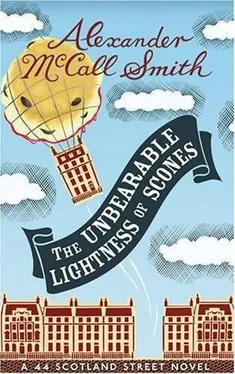Alexander Smith - Unbearable Lightness of Scones
Здесь есть возможность читать онлайн «Alexander Smith - Unbearable Lightness of Scones» весь текст электронной книги совершенно бесплатно (целиком полную версию без сокращений). В некоторых случаях можно слушать аудио, скачать через торрент в формате fb2 и присутствует краткое содержание. Жанр: Триллер, на английском языке. Описание произведения, (предисловие) а так же отзывы посетителей доступны на портале библиотеки ЛибКат.
- Название:Unbearable Lightness of Scones
- Автор:
- Жанр:
- Год:неизвестен
- ISBN:нет данных
- Рейтинг книги:4 / 5. Голосов: 1
-
Избранное:Добавить в избранное
- Отзывы:
-
Ваша оценка:
- 80
- 1
- 2
- 3
- 4
- 5
Unbearable Lightness of Scones: краткое содержание, описание и аннотация
Предлагаем к чтению аннотацию, описание, краткое содержание или предисловие (зависит от того, что написал сам автор книги «Unbearable Lightness of Scones»). Если вы не нашли необходимую информацию о книге — напишите в комментариях, мы постараемся отыскать её.
Unbearable Lightness of Scones — читать онлайн бесплатно полную книгу (весь текст) целиком
Ниже представлен текст книги, разбитый по страницам. Система сохранения места последней прочитанной страницы, позволяет с удобством читать онлайн бесплатно книгу «Unbearable Lightness of Scones», без необходимости каждый раз заново искать на чём Вы остановились. Поставьте закладку, и сможете в любой момент перейти на страницу, на которой закончили чтение.
Интервал:
Закладка:
Bertie’s eyes opened wide. The Young Liberal Democrats sounded almost as good as the Junior Melanie Klein Society, if such a thing existed. “She’ll like that,” he said. “It’s the sort of thing…”
“Of course it is,” said Tofu nonchalantly. “Now all you have to do is to invite me to play at your house some afternoon and then I’ll talk to her. How about tomorrow?”
Bertie swallowed. There was a very good reason why tomorrow would not be suitable, but all his other afternoons were taken up with Italian lessons and saxophone practice, and it was difficult to see how he could otherwise fit Tofu in. “There might be somebody else there tomorrow,” said Bertie. “But you can come too.”
“That’s settled then,” said Tofu. And then, quite casually, he asked, “Who is this other person, by the way?”
Bertie looked away. “It’s Olive,” he said shakily. “My mother invites her to play at my house. It’s not me, Tofu. I don’t invite her. I really don’t.”
Tofu wrinkled his nose in disgust. “Olive! You actually let her into your house?”
“I can’t stop her,” wailed Bertie. “It’s my mother, you see. She likes Olive.”
“You have big problems, Bertie,” said Tofu, shaking his head. “But I suppose I’ll have to come anyway. Olive!”
The conversation ended at that point and Bertie went away to think about what Tofu had said. His feelings were mixed. While he was excited at the prospect of joining the cubs – a uniform! – he felt anxious about the web of deceit that Tofu was so nonchalantly proposing to weave. The deception might work, but what if it did not, and his mother discovered that he had secretly enrolled in the cubs? There would be a most terrible row if that happened, and Bertie could just hear what his mother would say: When you tell a fib, Bertie, you’re telling a fib to yourself. Did you know that? And why, Bertie, why ever do you feel the need to wear a uniform? Is there something missing in your life?
Bertie shuddered. The dressing-down would be bad enough, but what would be worse would be the practical consequences. More psychotherapy. More Melanie Klein. More everything. More mother.
But then suddenly his defeatism lifted. He remembered a few days ago he had bumped into Angus Lordie, who was walking Cyril – and some boisterous puppies – in the Drummond Place Gardens. It was shortly after Bertie had read the Baden-Powell book and he asked Angus Lordie if he had ever been a scout.
“I was both a cub and a scout,” answered Angus. “And a great time I had too. I was kicked out of the scouts, of course, but I enjoyed it when I was in. Yes, you should join up, Bertie. Absolutely.”
He remembered now. It had been such a humiliation being kicked out of the scouts. It was like being excommunicated from the Catholic Church, where a candle was ceremoniously snuffed out to signify the exclusion. In Angus Lordie’s case, the scout master had taken his woggle from him. Such humiliation. Dewoggled.
21. Lost Opportunities
Domenica Macdonald, anthropologist, native of Scotland Street, confidante of the portrait painter and detoggled scout Angus Lordie, was sitting somewhat morosely at her kitchen table. Before her on the table was an open copy of that day’s Scotsman newspaper. She had just finished reading the letters column, a daily task she set herself in order to keep abreast with what people were thinking about. Today it had all been rather tame, and she found herself thinking back nostalgically to the days when the Scotsman letter column contained a greater number of letters from regular correspondents with a sense of mission. There had been Anthony J. C. Kerr of Jedburgh, for instance, who had written a letter to the paper virtually every week, and sometimes more often than that. His letters had been well-informed and entertaining; perhaps just rather frequent. Then there was the late Major F.A.C. Boothby, an energetic writer of letters on the subject of Scottish nationalism – right up to the time of his unfortunate removal to prison for conspiring to blow up an electricity pylon. Such people certainly had things to say, but blowing up pylons had been no way to convince anybody, thought Domenica.
Fortunately those days of excitable Scottish nationalism were over. While it had been necessary, Domenica felt, to repatriate the Stone of Scone by direct action, that is, by stealing it back, it was no longer necessary to do things like that in an age when the Government actually sent it back voluntarily, in a blaze of absurd, Ruritanian ceremony. She herself had been there in Parliament Square, watching in bemused astonishment as the Stone of Scone was driven up the High Street on a cushion; such a stressful day for any stone. And then it had been taken to the Castle, where it had been examined by a geologist! Really, she thought, was there no end to the comedy? Of course, Domenica rather approved of Ian Hamilton and his friends who stole the Stone of Scone back from underneath the coronation throne in Westminster Abbey; indeed, she took the view that the stone should have been repatriated a great deal earlier than it was. After all, it was stolen property, rather like the blue Spode teacup which her neighbour Antonia had removed from her flat, and both it – the stone – and the teacup should have been restored to their rightful owners a great deal earlier.
She glanced at the letter column in front of her and sighed. Those heady days were over. Now there were no more theological disputes, or historical debates, just letters about airport runways and European treaties and the like. And the Times letters column was much the same; the eccentrics, it seemed, no longer bothered to write letters about hearing cuckoos or, as in one famous letter, seeing a horse wear a pair of spectacles. It was all very bland.
She looked up at the ceiling. It was almost half past ten in the morning and she had not achieved a great deal that day. In fact, she had achieved nothing, unless one could count reading the paper as an achievement. And what about the rest of the day? What lay ahead of her? Domenica had never been one to be bored, but now, for the first time in years, she felt the emptiness of her future. Her social diary for the week was virginal, unsullied by any appointment; not one solitary invitation, not a single engagement of any sort. That, she knew, was the fate of those who made no effort to socialise, who never invited others and who received no invitations in return. But she had heard that it was also the fate of those who were very well-known, famous people who received no invitations because everybody assumed that they would not be able to come. This point had been made to her very poignantly by Iris Murdoch, the novelist and philosopher, who had been in Edinburgh to deliver the Gifford Lectures and who had been seen by Domenica sitting alone in the University Staff Club in Chambers Street. Domenica had hesitated, and had then gone up to her and asked her, somewhat apologetically, whether she minded if she came and said hello.
“Of course not,” said Iris Murdoch. “Nobody comes up to me and says hello. They feel that they cannot, and yet I wish they would. I’m sometimes terribly lonely, sitting by myself, with nobody daring to come up and say hello.”
That had surprised her, but then she had remembered that W. H. Auden experienced the same problem when he returned to Oxford and had taken up residence in a cottage in the gift of Christ College. It had been hoped that Auden would sit in a coffee shop and undergraduates would come up and engage him in – for them – improving conversation. Auden was willing to sit in the coffee shop, and did so, but very few people plucked up the courage to go and sit at his table and talk to him. So mostly he sat alone. Mind you, Domenica thought, Auden, for all his brilliance and for all the timeless beauty of his poetry, was very dishevelled. His suits were dirty, stained with soup and as covered with ash as the higher slopes of Etna; both Auden and Etna smoked. Of course the great poet did not change his clothing as frequently as he might have done; that may have discouraged people from joining him at his table. How sad, and what opportunities lost! To have been able to sit down at Auden’s table and ask what exactly he had meant when he wrote some of his more obscure poems – those puzzling words, for example, about looking through the lattice-work of a nomad’s comb: Domenica had her theory about that and would have liked to have tried it out on the poet himself. Too late now. One could no more have coffee and a chat with Auden than one could pop into Milne’s Bar and buy a whisky for more or less the entire Scottish Renaissance. We have lost so much, she thought, and here am I sitting in my kitchen thinking about loneliness and what one cannot do, when what I need to do is to go next door, immediately, and visit Antonia; not my first choice of company – especially after the incident of the blue Spode teacup – but better than nobody, and, of course, a source of amusement, with her extremely questionable taste in men.
Читать дальшеИнтервал:
Закладка:
Похожие книги на «Unbearable Lightness of Scones»
Представляем Вашему вниманию похожие книги на «Unbearable Lightness of Scones» списком для выбора. Мы отобрали схожую по названию и смыслу литературу в надежде предоставить читателям больше вариантов отыскать новые, интересные, ещё непрочитанные произведения.
Обсуждение, отзывы о книге «Unbearable Lightness of Scones» и просто собственные мнения читателей. Оставьте ваши комментарии, напишите, что Вы думаете о произведении, его смысле или главных героях. Укажите что конкретно понравилось, а что нет, и почему Вы так считаете.












